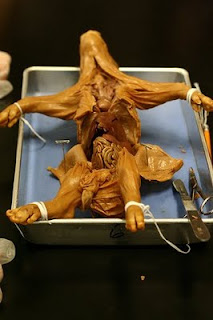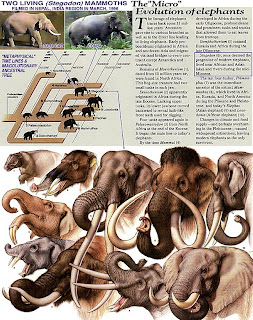Tuesday, May 17, 2011
Your choice talk about something you learned or ask a question about something that is confusing you
The only thing that I am confused on is the fish dissection I never really understood what I had to do. Especially the part where we had to find out how many fish years it was. It was too hard because I couldn't count the fish scales, there were too many. So that is why I want to ask you how are supposed to correctly tell the fishes age.
Define the different forms of community interaction: competition, commensalism, mutualism, predation, parasitism
Competition:
In ecology, the interaction between two or more organisms, or groups of organisms, that use a common resource in short supply. Sea Anenomes compete for the territory in tide pools
Commensalism- In ecology, commensalism is a class of relationship between two organisms where one organism benefits but the other is neutral (there is no harm or benefit).Barnacles attaching to scallops, not harming them.
Mutualism- Mutualism is the way two organisms biologically interact where each individual derives a fitness benefit A hummingbird benefitting from a flower, however the flower also benefits from it by getting pollinated.
Mutualism- In ecology, predation describes a biological interaction where a predator (an organism that is hunting) feeds on its prey (the organism that is attacked). Praying mantis eating a bee.
Parasitism- A type of symbiotic relationship between organisms of different species where one organism, the parasite, benefits at the expense of the other, the host Brood parasitism, on the egg.
In ecology, the interaction between two or more organisms, or groups of organisms, that use a common resource in short supply. Sea Anenomes compete for the territory in tide pools
Commensalism- In ecology, commensalism is a class of relationship between two organisms where one organism benefits but the other is neutral (there is no harm or benefit).Barnacles attaching to scallops, not harming them.
Mutualism- Mutualism is the way two organisms biologically interact where each individual derives a fitness benefit A hummingbird benefitting from a flower, however the flower also benefits from it by getting pollinated.
Mutualism- In ecology, predation describes a biological interaction where a predator (an organism that is hunting) feeds on its prey (the organism that is attacked). Praying mantis eating a bee.
Parasitism- A type of symbiotic relationship between organisms of different species where one organism, the parasite, benefits at the expense of the other, the host Brood parasitism, on the egg.
Blog#12 What surprised you from the worm's dissection?
what surprised me about the dissection was the size of the worm, it was big enough to identify the parts of the body. the parts of the body were were with long segments, surprisingly there was no blood mostly dirt and soil that was a very long worm i didn't expect to see a worm of that size.
Blog 13 What was most interesting about this week's dissections?
the most interesting thing about this weeks dissection was that we finally got to dissect a frog the frog had a bunch of eggs inside and it smelled nasty
Saturday, April 30, 2011
Blog #5 There have been 5 major extinction events throughout history, are humans impacting the 6th? Why or why not?
englishrussia.com/index.php/2010/03/20/tsar-bomb/I believe that humans are impacting the earth's 6th extinction by destroying our current environment and destroying our ecosystems such as rainforest and trees where many animals live. Humans are know ruining the earths environment by disrupting the natural way of things, such as off shore oil drilling and the mistakes that follow it. like the BP oil spill, millions of animals have died or suffered because of it. Humans are disrupting the natural ways of earth also with nuclear warheads. The United States has about 2000 nukes, while russia has at least 9000, if those things were to ever go off at once, the amount of radiation would surely cause many species to go extinct.
Blog #3 Explain what microevolution is? What are the three ways that variation occurs?
Microevolution refers to any evolutionary change below the level of species. It also refers to changes in the frequency within a population or a species of its diffrent genes Another thing that it refers to is their effects on the phenotype, of organism that make up that population or species. One way of variation that occurs is when all types of species produce far more offspring that one can survive to adulthood and reproduce. This means that many of those offspring will die without reproduction. Another way that variation occur is when the variation is heritable, that is if it exist in the parents and are passed on to the offspring. types of species vary in many ways. A third way that variation occurs is when some of those is heritable, which is when the variable traits affect an organism's fitness.
Blog #10 Why is dissection an important part of a biology curriculum? Which animals and/or plants should be included in biological studies?

Blog # 2 Why is fossil record hard to interpret?
http://www.google.com/imgres?imgurl=http://www.hgs.org/attachments/wysiwyg/14610/FossilAmonite.jpg&imgrefurl=http://www.hgs.org/en/art/2177/&usg=__d1J8s3CNZ8RnySaPxQC_n86invM=&h=721&w=800&sz=120&hl=en&start=1&sig2=2cxCBnceLIok1bVUOzUZAw&zoom=1&um=1&itbs=1&tbnid=q_iUnsM53g0jUM:&tbnh=129&tbnThe translation of the fossil record has been based upon various types of preservation. Some species are underrepresented or have not yet been found. We are left with a vague picture of the past, especially the beginning of the past. Whether an organism is preserved greatly based on the surrounding environment from which it died. Plants and animals from humid tropical forests are rarely preserved because they decompose rapidly in these regions. Similarly, fossils from high elevation areas rarely survive due to high rates of erosion. Desert creatures generally become fossilized more often due to the preserving arid conditions. aquatic organisms are often well preserved if their bodies ended up in deep water where there is little oxygen and life. Not all bones from the same animal survive equally well. Lightweight bones with relatively large surface areas deteriorate more quickly and are, therefore, less often fossilized. Small, delicate bones are also more likely to be crushed or carried away from the rest of a skeleton by running water. There is fossil record resulting from the fact that paleontologists have not equally searched all areas of the globe. Because of the inaccessibility of some regions, such as Central Asia and much of Africa, their fossil records are poorly understood compared to those of Europe and North America.
Subscribe to:
Comments (Atom)


